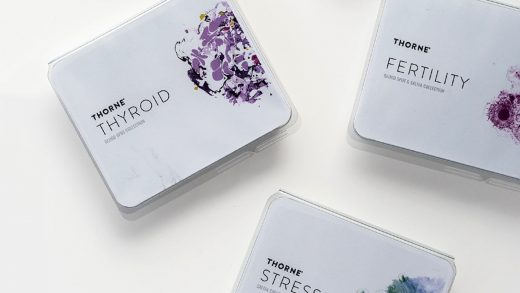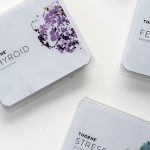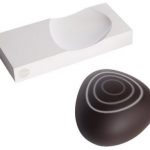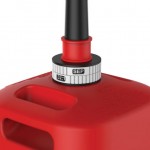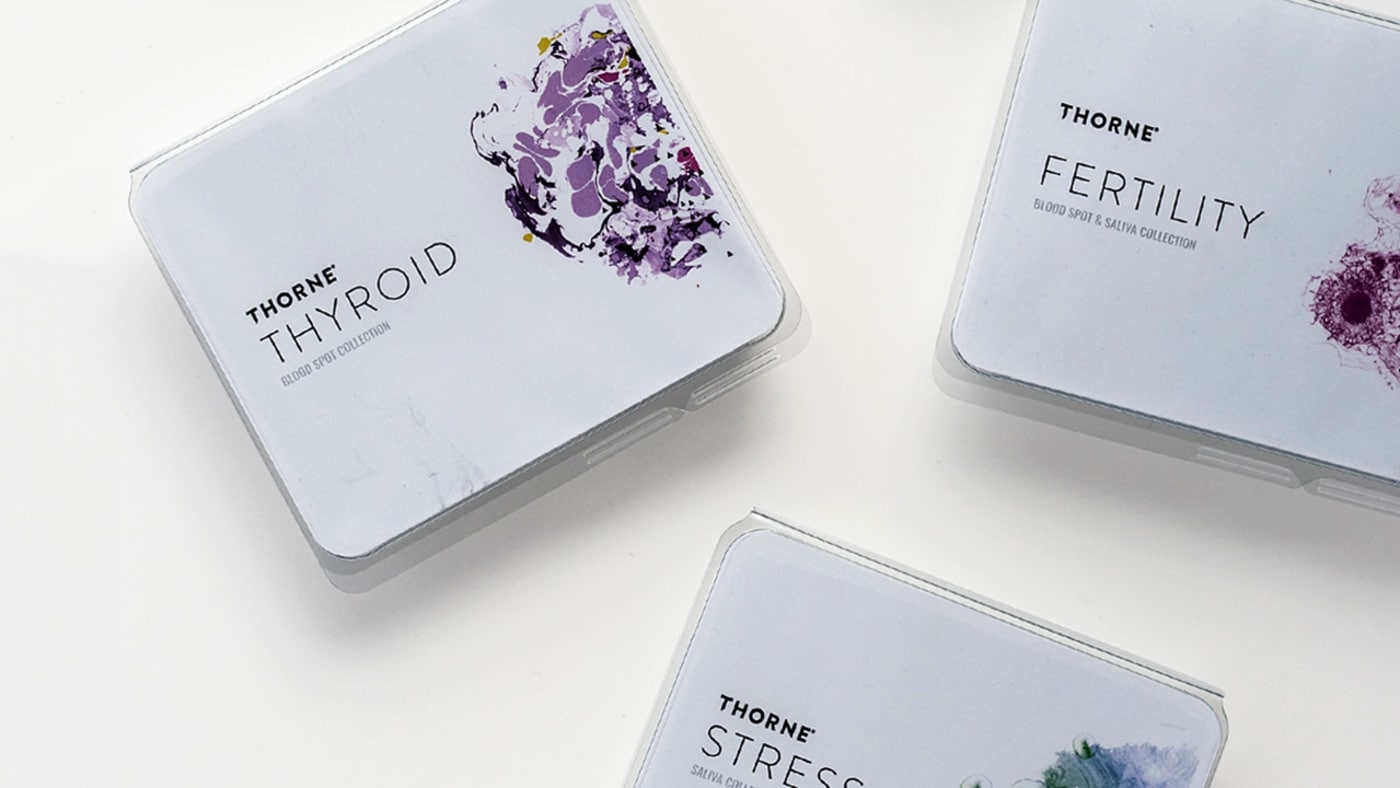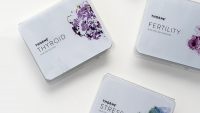Is This Home Hormone Test Analyzing My Stress Or Selling Supplements?
I finally have medical backing when I say, “I’m stressed.” It’s no longer a baseless excuse.
According to Thorne, which sells an at-home test to analyze hormone fluctuations, my cortisol and DHEA (i.e., stress hormones) levels are “out of balance.” It explains why I’m groggy in the morning and tethered to the couch by night.
“You might be experiencing a tough time getting out of bed,” reads the results report, which I quickly hand to my husband as a get-out-of-housework card.
“Here’s my doctor’s note,” I explain as I sink back into bed.
I’m also told I’m prone to the following symptoms, which feels like the side effects warning at the end of a prescription drug commercial: anxiety, depression, poor memory, lower sex drive, dry skin, difficulty losing weight, joint pain, and unbalanced blood sugar regulation, among other Debbie Downers.
I learned of my bodily disappointments by first filling out an online questionnaire on my daily habits, environment, and (lack of) exercise. I then spat in four tubes every few hours over the course of a day. Yes it sounds strange, but Dr. Sara Gottfried, author of The Hormone Cure, confirms that at-home saliva tests are valid for cortisol and DHEA and have been studied extensively by the scientific community
I then shipped a pre-stamped package of the vials back to Thorne, which uses a mix of AI machine learning and a medical staff to review the samples.
A week later, I received my results, which vastly differed from bland medical reports. A visual dashboard presented solutions from exercise (“focus on resistance training in the morning”) to well-being (“practice yoga and meditate”) to food (“drink grapefruit juice or eat licorice” and “choose a Mediterranean diet”). Lastly, the personalized health startup recommended supplements for bone nutrients and adrenal function, which the company manufactures and sells on its site.
“We don’t want to just do a data dump,” says Paul Jacobson, CEO of Thorne Research Inc., explaining the company’s holistic approach to consumer healthcare. At the same time, he concedes that at face value, it might look self serving. “We’re not generating results to sell supplements, but we think it’s important that there’s a solution available for a client, should they want the opportunity to do something about their health.”
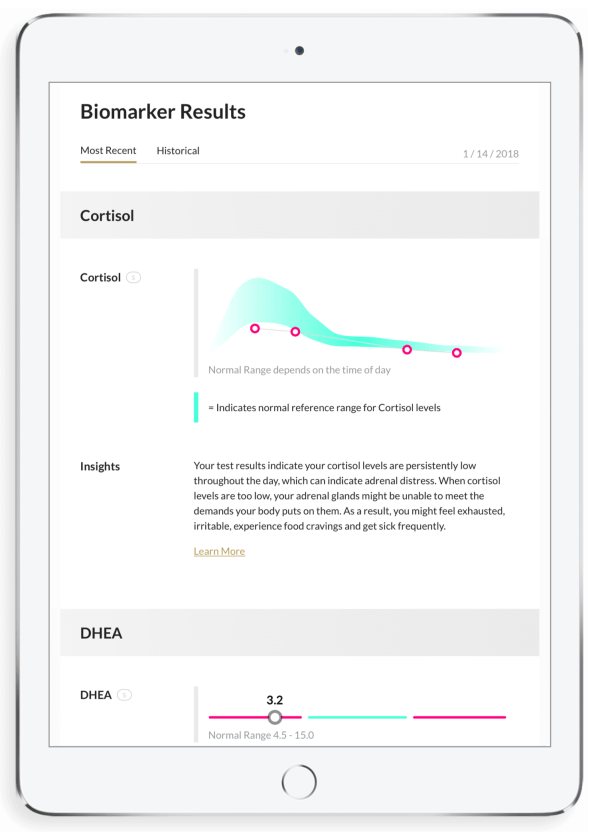
Home Is Where The Healthcare Is
In 2010, Paul Jacobson acquired Thorne when it was a direct-to-practitioner supplement company. As the only supplement manufacturer to collaborate with the Mayo Clinic on research, it had a reputation for high-quality products, but spent little on marketing or consumer outreach. In it, the entrepreneur saw the makings of a health company that could combine wellness solutions with technology.
Jacobson went to work refashioning the supplement science company into a full-range business that offers at-home tests for stress, sleep, fertility, heavy metals, and thyroid disorders, all ranging from $165 to $270. The process blends physician oversight with AI machine learning, resulting in a personal plan for how to eat, exercise, and supplement based on unique test results.
Thorne’s algorithm correlates millions of data points from medical and scientific literature, test results, and other data on lifestyle. If results show drastic health issues, a doctor calls the patient to recommend next steps. (If you do not have a physician, Thorne helps you locate one through their large network of healthcare practitioners.)
“The AI platform will improve as we receive more data points,” says Jacobson. “It will help doctors and patients learn more from existing knowledge at a far faster pace.” Thorne wants its artificial intelligence platform to help doctors in their ability to make diagnoses and subscribe lifestyle changes. He thinks this is vital for the future of medicine, noting that machine learning “is the way to achieve scale and drive the cost of healthcare down.”
Who Takes This Kind Of Test
“We’re trying to create almost a new category,” says Jacobson.
Thorne’s customers include the obvious, like the bio-hacker community (“They are clearly really into this,” reports Jacobson), as well as the athletic industry, such as 35 U.S. professional sports teams and 11 national governing bodies for the Olympics.
The company also witnesses an uptick in general consumers under 40 who want control of their health in a convenient, affordable manner. The most popular kit is the heavy metals/detox test, as customers look to counteract environmental impacts and toxins.
At-home medical kits have come a long way in the last few years, when it was once purely associated with pregnancy tests. Consumers increasingly put trust in startups offering clinical analysis of their sexual health, microbiome, and fertility. They’re even available at WalMart. And despite some medical controversy, they’ll only get more funding and more popular: The DIY testing market is expected to reach $340 million by 2022 as research further develops.
“Healthcare is moving to the home,” predicts Jacobson, who sees physicians–much like the ones he employs–innovating ways to bring medical expertise straight into consumers’ hands. He also sees such change reflected in the industry’s emphasis on prevention; that means pushing achievable and tailored lifestyle improvements instead of relying on a later drug regimen.
The company’s ultimate goal is to delve into “a much more sophisticated testing model,” Jacobson says, which includes blood genetics, microbiome and skin bio, and then “tie them all together” with current offerings.
The challenge is making the home testing experience as comfortable and widespread as possible. The company currently collects saliva, urine, and blood, the latter with a finger stick, an experience Jacobson finds less than ideal (and a bit painful). Thorne recently invested in Drawbridge Health, a medical device company with a new way to collect blood. One places their tricep in a handheld contraption, pushes a button, and it reportedly draws out a significant amount of blood–painlessly–into a cartridge. It’s currently awaiting FDA clearance.
Ultimately, such investments are meant to pave the path for greater blood testing–making it easier, simpler, and less frightening for those afraid of needles. “There’s 1 billion blood draws a year in the United States, and maybe one-third of those draws could be eligible for something like this,” says Jacobson. The more convenient the test, the more popular it can become–and the more data Thorne can collect and use.
Jacobson asserts that as he grows his business it will grow further from its supplement-selling roots. “We’re science-based,” he says, “not supplement hawkers.”
(25)

